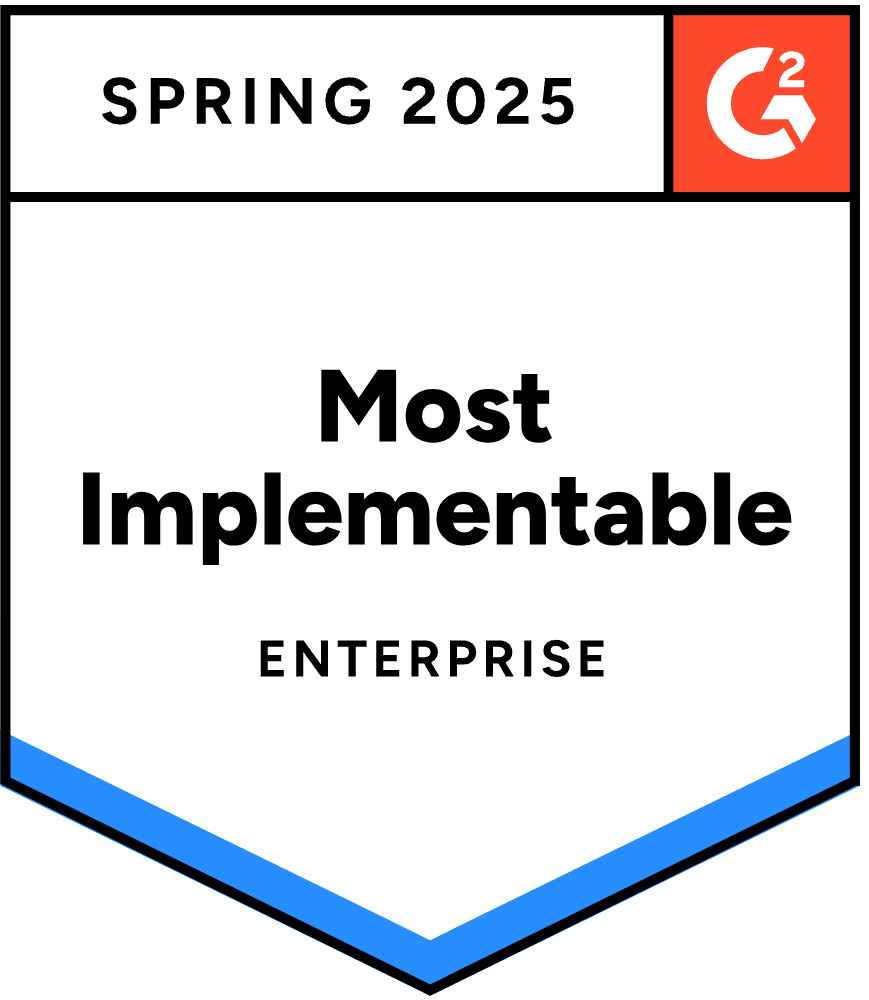Harnessing AI for Smarter Sales Enablement
Anna Spooner | WorkRamp Contributor
View bioLearning Tips Straight to Your Inbox
Is AI taking over the universe? It’s certainly here to stay as teams discover the implications of AI in the working world and companies battle to be the ones leading the charge.
As the debate around AI rages on, savvy professionals are exploring the ways in which this powerful technology can enhance their teams and give them a competitive edge. With the right use of AI, your sales team can see a significant boost in performance and enablement, which is worth being excited about.
Whether it’s through personalized content creation or advanced lead scoring, AI presents various opportunities for improving sales enablement. If you’re looking to stay ahead of the competition and drive impressive results, it’s essential to dive into these tools and learn to use them effectively. With the right approach, you can unlock a whole new level of success for your sales team.
In this post:
Types of AI tools
When we talk about AI, most people think immediately of ChatGPT and other generative AI tools, which have become extremely popular. However, that’s only one form of AI and how it’s used in sales enablement.
AI tools can also:
- Help score leads so reps take a more targeted approach
- Help managers and supervisors understand gaps in sales rep performance for better coaching
- Allow you to map the customer journey using real customer data at scale rather than guesses or estimates based on a handful of interviews
- Roleplay specific scenarios with sales reps as many times as needed in a no-pressure environment (they don’t look foolish to a boss)
- Provide proactive advice to sales reps during sales conversations, helping them provide the right information to leads at the right time
- Surface the sales materials a rep needs quickly so sales reps spend far less time searching and more time selling
However, AI isn’t a replacement for real people guiding the process. There are both benefits and drawbacks to AI in any application, including sales enablement, so be sure you’re aware of the usefulness and limitations of the tools before you dive in.
How AI can help sales enablement
AI can save time and streamline processes for busy sales managers without taking away valuable learning opportunities for reps.
Leveraging AI can help you outpace your competitors, as only 37 percent of sales organizations use AI in the sales process, but 57 percent of high-performing sales teams use AI.
Create and adapt sales content
Part of what amazed everyone about ChatGPT is the giant leap forward in the quality of generated content. There have been content generators for years, but they always spit out low-quality, often nonsensical content.
Today’s generative AI tools can create sensible, engaging content in seconds. That means you can create new content and adapt existing content more effectively. Even better, AI can personalize existing sales content to the lead’s specific needs.
At times, sales reps have commented that sales materials are irrelevant, outdated, or too hard to customize to the customer. One study showed that 9 out of 10 B2B sales reps don’t use sales materials for exactly those reasons.
With AI, you can fix those problems quickly and keep sales materials more relevant. Sales reps can also use generative AI to customize sales materials to a lead’s precise needs without taking precious time to figure out what to say.
All generative AI has to be fact-checked and edited, but having a baseline draft in seconds will save teams hours in content creation and help sales reps personalize sales materials and improve their results.
Make writing emails to leads easier
Many companies have drip campaigns that nurture leads, but once those leads are transferred to a sales rep, a lot of the emails are manual. Unfortunately, that can be challenging for some reps who struggle with starting an email or making it engaging and fun.
Generative AI, when fact-checked and edited, can be an incredible tool for this. You can ask an AI tool to take the role of a sales rep, and if the results are too dry or unprofessional, you can ask for a revision.
Finding the right way to say something doesn’t have take hours. Instead, your sales rep can be done in a couple of minutes using edited AI content.
AI-assisted coaching
Every sales rep has gaps in their technique that need sales coaching. Sometimes, they simply need to practice a pitch until it’s perfect, or they need to address different objections in a low-stress environment so they can create a response strategy.
Working with every sales rep one-on-one can be challenging for a sales manager. However, with AI-assisted coaching, a rep can practice their pitch as often as needed, with no pressure. No one is watching, and the AI can be trained to give useful feedback on different approaches.
AI can also provide various objections for sales reps to respond to, with feedback on how the customer might feel hearing each response. All of this can happen without the direct involvement of the sales manager, saving time while sales reps still get the attention they need.
Mapping the customer journey at scale
Sales enablement teams are always trying to nail down the elusive customer journey.
Customers don’t always do what we’d like them to, but it’s essential to know the customer’s process so sales reps can respond accordingly.
However, up to now, we’ve been stuck doing this theoretically or using a handful of customer interviews. AI can completely change the game. With the data processing capabilities available, AI can take thousands of customer journeys, look at them all together, and create a much more precise sales process than any sales enablement team could alone.
It’s exciting to think about the possibilities of being able to create a single process that will improve sales, anticipate concerns, and keep users moving forward toward a purchase.
AI-guided selling
What if every sales rep had a coach sitting with them, advising them on what to say during conversations, and handing them the right sales materials at exactly the right time?
You can’t deny that sales would increase, and reps would be more confident in their conversations. Of course, no one has the budget to do that with people, but with AI-guided selling, reps can get exactly that kind of input.
Sales reps spend hours finding the right sales assets to send out, creating presentation decks, and doing lead research to tailor the sales conversation. With AI-guided selling, this information is surfaced immediately, saving tremendous time and allowing sales reps to focus on what they do best—selling!
Save time on administrative and scoring tasks
Salesforce recently found that sales reps only spend 28 percent of their time selling. Instead, reps’ time is spent researching prospects, generating quotes and proposals, manually entering customer information, and administrative tasks.
AI baked into the sales system can significantly shorten the time this work takes, allowing reps more time to sell and move deals forward. With AI lead scoring, sales reps can know which leads to focus time on without spending hours researching. Administrative work can be automated or assisted, as in the email-writing example we gave earlier.
AI saves time for managers as well. Not only can coaching gaps and performance issues be spotted more quickly, but AI also allows managers to understand large amounts of data and take action rather than spending dozens of hours analyzing it. This will enable leaders to lead rather than keeping them stuck in front of spreadsheets.
Improving upsell and cross-sell opportunities
Unless a lead specifically mentions an additional need, it can be challenging for sales reps to upsell or cross-sell effectively. After all, they’re often guessing at additional needs.
However, AI-powered tools can go a step further, analyzing the customers who got the most out of your additional tools and upgrades and letting a sales rep know when a lead matches the same profile. That way, your sales reps know precisely which other features to offer, and they can give compelling reasons why.
Best practices and cautions for using AI
Many people, including sales reps, are concerned that AI will eliminate their jobs. However, this is not the case—sales will always be a person-to-person interaction, and a sales rep will be necessary to help build trust and encourage a prospect through the buying process.
There are several best practices and cautions that are important to keep in mind when using AI.
Always give a human the final say
For companies trying to cut costs, replacing workers with AI might seem like a good idea—but it is not. AI doesn’t have feelings or understanding, so it can give bad advice as quickly as good if something goes wrong.
That’s why it’s essential always to have a human looking over AI’s output before it’s incorporated into reports, presentations, sales materials, or anything else. A person can spot problems, inaccuracies, and suspicious conclusions. For example, the AI might be using data that’s inaccurate or of poor quality, which could lead to false conclusions.
AI isn’t perfect, so always double-check!
Ensure your AI tools align with business objectives
It’s always fun to be on the cutting edge of new technologies, but in business, it’s important that any investment have a positive ROI. Don’t buy new software because it includes “AI” in the name or description.
Instead, carefully investigate the new software’s capabilities and compare them to your current solutions to ensure the investment will improve your current processes and results.
It’s easy to get excited about all things AI, but matching your investments with business needs is vital.
Help employees understand and embrace AI tools
Because AI is such a buzzword, simply telling employees they will be using AI tools can arouse fear that employees will be replaced.
Help your sales reps understand that AI tools are just additional ways to help them quickly get and personalize the sales materials they need, save time on administrative tasks, improve coaching, and increase close rates.
Helping sales reps and other employees understand that AI is designed to help them succeed will help improve the adoption of AI tools and maximize the benefit your company gets from its investment.
Watch for unintentional bias in AI tools
AI software is ‘trained’ using massive amounts of data, allowing the software to know how to analyze similar data in the future. However, the training is only as good as the base data, which may not be unbiased or take important diversity initiatives into account.
For example, an AI tool in hiring could be trained to rank universities from “better” to “worse” and then evaluate candidates based in part on that rating of their education. However, depending on how AI decides which universities are better or worse, it can quickly introduce racial and socioeconomic bias into your hiring process without anyone realizing it.
In sales enablement, AI coaching and AI sales helpers may also have biases in lead scoring or make inappropriate suggestions depending on the data they were trained on. These biases can be magnified exponentially due to the large volume of suggestions and analyses created daily, which means they can negatively impact your organization.
Remember that AI doesn’t have ethics
AI can seem quite human, but it falls short of human reasoning and ethics. That means that not everything AI suggests should be done, especially if it involves unethical sales behaviors.
Your employees are likely already using AI
One of the reasons it’s important for companies to embrace AI and create policies for proper use is that many employees are already using AI in their work.
A recent Fishbowl survey found that 43 percent of professionals already use ChatGPT, and 68 percent haven’t told their employer. That means that organizations aren’t in control of how employees use AI, even though it can dramatically impact the business.
Set your organization up for sales success
Success in sales requires many moving parts—the right software, excellent training, and tools to help employees implement the sales process.
A big part of that is your sales enablement platform. The best option is to choose a sales enablement platform that can also support new hire training, customer education, employee development, and other training needs in your organization.
The Learning Cloud from WorkRamp can help you create and deploy engaging sales training for your reps, as well as learning programs for your employees. Discover how the Learning Cloud can help you streamline learning at your organization. Contact us for a free, personalized demo.
Complete the form for a custom demo.
Recent Posts
- Top LMS Integrations That Power Smarter, Faster Learning July 2, 2025
- Introducing WorkRamp Analytics Studio: Unlocking Your Data Insights with AI June 30, 2025
- 11 AI LMS for AI-Powered Learning June 27, 2025
- The Best LMS Platforms for Customer Retention (2025 Guide) June 27, 2025
- 11 Best AI Learning Platforms June 16, 2025
Anna Spooner
WorkRamp ContributorAnna Spooner is a digital strategist and marketer with over 11 years of experience. She writes content for various industries, including SaaS, medical and personal insurance, healthcare, education, marketing, and business. She enjoys the process of putting words around a company’s vision and is an expert at making complex ideas approachable and encouraging an audience to take action.
You might also like
Tap into the power of AI for enablement
Early AI applications are already impacting the enablement space, and there’s still more to come. Jenn Casper, Senior Manager of Enablement at Chronosphere shares three ways she’s tapping into the power of AI as an enablement leader.
Read More
Why Enablement Should Be at the Executive Table
Enablement is critical to the success of your organization. In fact, research shows that organizations with a sales enablement function have way higher win rates than organizations that don’t. So why don’t we always have a seat at the executive table?
Read More
3 essential sales enablement tools
Too many tools can be distracting for reps. Here are the enablement tools you really need to achieve sales goals.
Read More
Ready to Explore Online Learning Platforms?
Get in touch to learn how WorkRamp can help you achieve your training goals.
Request a Demo




